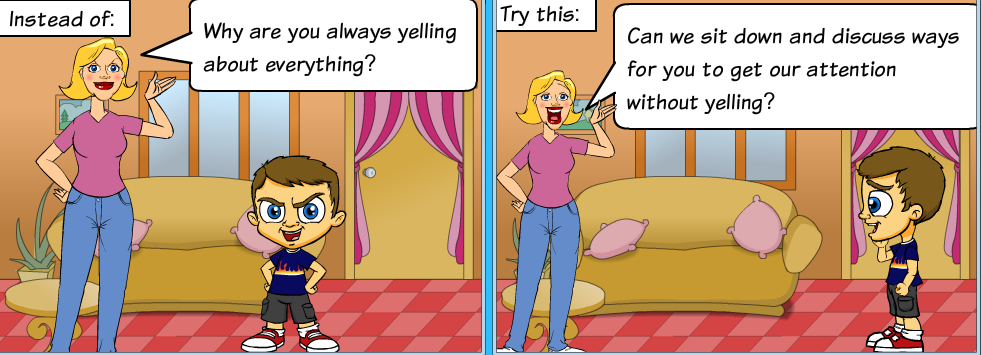The summertime is in full swing, and I see many parents hanging out with their kids and having a good time. But I also see many moments of frustration. It is hard to shuttle kids to the many fun activities we have planned for the warm weather. It is not just the kids who get hot, tired, and cranky. Parents feel it as well.
It is usually when we experience communication “fails,” that we use a blaming or accusing tone with our kids. (Disclaimer: Before we move on to learn some better communication techniques, it needs to be said that communication “fails” are a part of parenting. They are a part of any relationship you have. That has to be okay. We do not have to be perfect parents; kids need to see parents who are real.)
That being said, parents may accuse their children:

“Why do you always leave your muddy cleats in the front hall?”
This does not encourage kids to do what they need to: find a better spot for their muddy cleats. It also sets a negative tone. It usually brings on defensive behavior and can lead to a power struggle.
A better way is to keep language neutral. When we speak to kids more respectfully, we encourage cooperation and teamwork. We need to use language that is non-confrontational and focused on the result:
It is better to say:
“We need to figure out a place for your muddy cleats. Let’s try to think of some options.”
This language helps kids think constructively instead of putting them on guard. It pushes kids to think, “I can think of ways to help my parents and keep this house in order.” Instead of, “Why are they always nagging and bothering me.”
Here are some more examples of how we can change the way we communicate from accusing to encouraging.
Instead of saying:
“Why are you always yelling about everything?”
Try saying this:
“Can we sit down and discuss ways for you to get our attention without yelling?”
Instead of saying:
“Get into the car already! You always make us late!”
Try saying this:
“Time is short. Children need to get into the car ASAP!”
Instead of saying:
“Why does everything always have to be such a problem!”
Try saying this:
“You seem upset about swimming today instead of the park. Right now we are going to the swimming pool. We will discuss our plans for the next few days when we get there.”
Communication with kids does not need to be fraught with tension. Using neutral and non-confrontational language helps parents feel in control and keep kids feeling encouraged. It will hopefully keep any communication “fails” at a minimum this summer.
